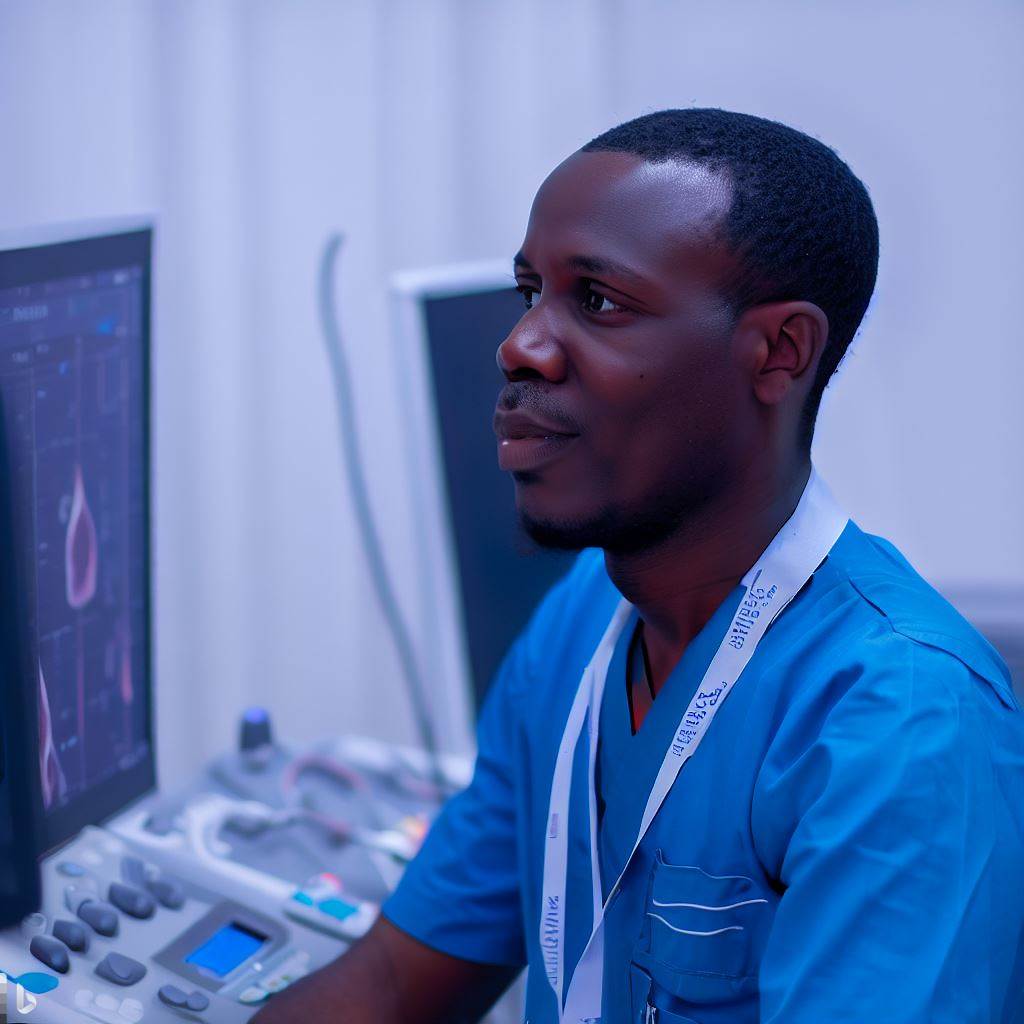Introduction
Importance of Diagnostic Medical Sonographers in Healthcare
As the backbone of medical imaging, diagnostic medical sonographers play a vital role in diagnosing and treating various health conditions.
Their expertise and precision aid in providing accurate diagnoses, saving lives, and enhancing patient care.
Role of a Diagnostic Medical Sonographer
Diagnostic medical sonographers are highly skilled professionals who use ultrasound technology to capture detailed images of patients’ internal organs.
These images help physicians diagnose diseases, monitor fetal development, and guide medical procedures.
Focus on a Day in the Life of a Diagnostic Medical Sonographer in Nigeria
This section sheds light on the challenging yet rewarding career of a diagnostic medical sonographer in Nigeria. It explores the daily responsibilities, obstacles faced, and the impact they have on patients’ lives.
Being a diagnostic medical sonographer requires technical expertise, empathy, and a strong attention to detail.
In Nigeria, where healthcare resources may be limited, these professionals hold great significance in improving the quality of healthcare.
By providing critical diagnostic information, they contribute to better patient outcomes and facilitate timely treatment interventions.
Next, we will delve into a typical day in the life of a diagnostic medical sonographer in Nigeria, offering an insight into their varied tasks, professional challenges, and the satisfaction derived from helping others.
Educational Requirements and Training
To become a diagnostic medical sonographer in Nigeria, one must have a strong educational background in medical imaging.
It is essential to obtain a bachelor’s degree in diagnostic medical sonography or a related field. The program should be accredited by the Nigerian Medical Sonographers Association (NMSA).
The curriculum typically includes courses in anatomy, physiology, medical imaging principles, and sonographic techniques.
Practical clinical experience is a vital part of the educational requirements, giving students hands-on training.
Students should also complete a certain number of supervised clinical hours to gain expertise. After completing the education program, graduates are eligible to apply for certification.
Certification and Licensing Process
Certification is an important step in becoming a diagnostic medical sonographer in Nigeria.
The Nigerian Medical Sonographers Association (NMSA) offers certification examinations to those who meet the requirements.
Eligibility criteria include completion of an accredited education program and submission of required documentation.
Once certified, individuals are recognized as Registered Diagnostic Medical Sonographers (RDMS). Licensing is required to practice as a diagnostic medical sonographer in Nigeria.
The Nigerian Medical Sonographers Association (NMSA) issues licenses upon successful completion of the certification process.
Importance of Ongoing Training and Professional Development
Ongoing training and professional development are crucial for diagnostic medical sonographers in Nigeria. Technology and medical advancements are continually evolving, requiring sonographers to stay updated.
Participating in professional development activities ensures the use of the latest techniques and equipment. Continued education improves diagnostic skills, accuracy, and quality in providing patient care.
Attend conferences, workshops, and seminars to enhance knowledge and network with other professionals. Continuing education units (CEUs) are necessary to maintain certification and licensing.
Regular training opportunities help sonographers stay abreast of industry changes and advancements. By staying current, diagnostic medical sonographers provide the best possible care for patients.
Continuing education also provides opportunities to specialize in different areas of diagnostic medical sonography.
In essence, to become a diagnostic medical sonographer in Nigeria, one must have a strong educational background in medical imaging, complete a recognized program, obtain certification, and acquire the necessary licenses.
Ongoing training and professional development are essential for keeping up with advancements in the field and providing high-quality patient care.
Read: Dental Association of Nigeria: An Overview
Job Responsibilities and Duties
Overview of the primary responsibilities of a diagnostic medical sonographer.
A diagnostic medical sonographer is responsible for using ultrasound technology to create images of patients’ internal organs and tissues.
They assist physicians in diagnosing and treating various medical conditions.
The use of ultrasound technology and its applications in various medical diagnoses.
Ultrasound technology uses high-frequency sound waves to produce real-time images of the body’s internal structures.
It is a non-invasive and safe imaging technique that helps diagnose conditions such as pregnancy, heart diseases, and abnormalities in organs like the liver, kidneys, and thyroid.
The different types of ultrasounds performed by diagnostic medical sonographers.
- Obstetric Ultrasound: This type of ultrasound is used to monitor the development of fetuses during pregnancy and detect any abnormalities.
- Abdominal Ultrasound: It examines the organs in the abdomen, including the liver, gallbladder, kidneys, pancreas, and spleen to detect diseases or abnormalities.
- Cardiac Ultrasound: Also known as echocardiography, it is used to assess the structure and function of the heart and diagnose cardiac diseases.
- Musculoskeletal Ultrasound: It examines muscles, tendons, ligaments, and joints to diagnose conditions like sprains, tears, and arthritis.
- Vascular Ultrasound: This type of ultrasound evaluates blood flow, detects blood clots, and assesses the health of blood vessels in the body.
- Breast Ultrasound: It assists in diagnosing breast abnormalities such as lumps, cysts, and tumors, and helps in guiding biopsies or needle aspirations.
- Thyroid Ultrasound: Used to evaluate the thyroid gland, detect nodules, and assess their size and characteristics.
- Pelvic Ultrasound: It examines the organs in the pelvis, including the uterus, ovaries, and bladder, to diagnose conditions such as fibroids, cysts, and tumors.
Read: Practical Skills Every Nigerian Exercise Physiologist Needs
Work Environment
The typical work setting for diagnostic medical sonographers in Nigeria
Diagnostic medical sonographers in Nigeria usually work in hospitals, clinics, and diagnostic centers. They may also work in mobile imaging units that visit different locations.
The work setting is typically clean, well-equipped with imaging equipment, and comfortable for patients.
Sonographers may work in dimly lit rooms to enhance image quality during ultrasound examinations. They may also move around frequently to different areas within the healthcare facility to perform examinations.
The working hours and potential for on-call duties
Diagnostic medical sonographers in Nigeria typically work full-time, which is around 40 hours per week.
However, they may also have irregular working hours depending on patient demand and the facility’s operating hours. Some sonographers may have to work evening shifts, weekends, or public holidays.
There is a potential for on-call duties, especially in emergency cases or when the facility requires 24-hour ultrasound services.
On-call duties may require sonographers to be available at any time and be responsive to emergency requests.
The importance of teamwork and collaboration with other healthcare professionals
Diagnostic medical sonographers in Nigeria value teamwork and collaboration with other healthcare professionals. They work closely with radiologists, physicians, and other members of the healthcare team.
Collaboration assists in accurate diagnosis, patient management, and treatment planning.
Sonographers communicate with referring physicians to understand the clinical background and specific imaging needs.
They coordinate with nurses and technologists to ensure patient safety and comfort during procedures.
Teamwork is crucial in maintaining efficient workflow, sharing knowledge, and providing quality patient care.
In summary, the typical work environment for diagnostic medical sonographers in Nigeria includes hospitals, clinics, and diagnostic centers.
They may also work in mobile imaging units. The working hours can be full-time, including irregular shifts, weekends, and on-call duties.
Sonographers emphasize teamwork and collaboration with other healthcare professionals to provide accurate diagnoses and quality patient care.
Read: Role of Dentists in Nigeria’s Healthcare System

See Related Content: A Day in the Life of a Nigerian Nutritionist: What to Expect
Discover More: Personal Experiences: Life as a Physician Assistant in Nigeria
A Day in the Life of a Diagnostic Medical Sonographer
A typical workday for a diagnostic medical sonographer in Nigeria
As a diagnostic medical sonographer in Nigeria, every day is filled with intriguing challenges and rewarding moments.
The job involves performing ultrasounds to accurately diagnose and monitor various medical conditions in patients.
From the moment I step into the office, I know that my day will be filled with diverse cases and opportunities to make a difference in people’s lives.
The morning routine and preparations for the day’s appointments
My day begins with a cup of coffee to help me energize for the demanding tasks ahead.
I review the schedule and gather the necessary equipment and supplies, ensuring everything is calibrated and in proper working condition.
Once I’m ready, I head to the waiting area to greet and reassure the patients, who may be nervous or anxious about the procedure.
The process of performing ultrasounds on patients, including the equipment used and patient interaction
During the ultrasound procedure, I use a handheld device called a transducer, which emits high-frequency sound waves.
These sound waves penetrate the patient’s body, creating images of the internal structures on a monitor.
I carefully apply a gel on the patient’s skin to maximize sound wave transmission and ensure accurate imaging.
Guiding the transducer over the designated area, I capture images that help diagnose conditions such as pregnancy, organ abnormalities, and tumors.
Throughout the procedure, I maintain open communication with the patient, explaining each step and reassuring them during any discomfort or uncertainty they may experience.
The importance of accuracy, attention to detail, and patient privacy
Accuracy and attention to detail are paramount in my role as a diagnostic medical sonographer.
Every image I capture must be of the highest quality to aid the healthcare team in making accurate diagnoses and treatment plans.
I am also committed to protecting patient privacy and confidentiality, ensuring that their personal information remains secure at all times.
The challenges and rewards of the job
Being a diagnostic medical sonographer can be challenging due to the wide variety of patients and unique medical conditions encountered daily.
Each case presents its own set of complications, requiring adaptability and quick thinking to provide the best possible care.
However, the rewards of this profession are immeasurable. Witnessing the joy on an expectant mother’s face when she sees her baby for the first time is indescribable.
Helping patients receive timely and accurate diagnoses provides a sense of fulfillment that makes the challenges all worthwhile.
Overall, being a diagnostic medical sonographer in Nigeria offers a fulfilling career dedicated to improving healthcare outcomes in our community.
Read: Insights into Dental Internship Opportunities in Nigeria
Career Prospects and Salary
Job Outlook for Diagnostic Medical Sonographers in Nigeria
The job outlook for diagnostic medical sonographers in Nigeria is expected to be positive. There is a growing demand for medical imaging services, including ultrasound, in the country.
Hospitals, clinics, and diagnostic centers are constantly seeking sonographers to meet the increasing need.
This demand is driven by the rising prevalence of diseases and the need for accurate diagnostic imaging.
Furthermore, advancements in technology and medical equipment create new opportunities for sonographers.
Overall, the job outlook for diagnostic medical sonographers in Nigeria is favorable, with a steady growth rate.
Career Advancement and Specialization
Diagnostic medical sonographers in Nigeria have excellent prospects for career advancement.
With experience and further education, sonographers can specialize in specific areas such as obstetrics, cardiology, or musculoskeletal imaging.
Specialization allows sonographers to develop a higher level of expertise and opens up opportunities for higher-paying positions.
Additionally, sonographers can pursue managerial roles, research positions, or teaching opportunities in related educational institutions.
Continuing education programs and certifications are available to support career advancement and specialization.
Overall, diagnostic medical sonographers in Nigeria have numerous options for professional growth and development.
Average Salary Range for Diagnostic Medical Sonographers in Nigeria
The average salary range for diagnostic medical sonographers in Nigeria can vary depending on several factors.
In entry-level positions, sonographers can expect to earn between [Naira amount] and [Naira amount] per month.
With experience and specialization, sonographers can earn higher salaries, potentially reaching [Naira amount] per month or more.
Salaries may also vary based on the location and type of healthcare facility. Larger cities or private clinics may offer higher salaries compared to rural areas or public hospitals.
Nevertheless, diagnostic medical sonographers in Nigeria can earn a competitive income, reflecting their skills and expertise.
Overall, the job outlook for diagnostic medical sonographers in Nigeria is positive. There is a growing demand for their services, creating opportunities for employment.
With experience and further education, sonographers can advance their careers and specialize in specific areas.
The average salary range for sonographers in Nigeria varies depending on factors such as experience, specialization, and location.
However, the income is generally competitive, allowing sonographers to earn a respectable living.
Conclusion
In summary, a day in the life of a diagnostic medical sonographer in Nigeria is challenging yet rewarding.
These professionals play a crucial role in the healthcare system by providing accurate diagnoses and assisting in patient treatment plans.
If you are passionate about healthcare and helping others, consider a career as a diagnostic medical sonographer in Nigeria.
Join the ranks of healthcare heroes and make a difference in people’s lives. Take action today!




